The Global Health Initiative aims to be a platform for information exchange, cooperation, and activity support among sectors, clusters, associated organizations, and support organizations involved in global health, in a broad sense.
“Global health” is a wide-ranging field that spans both universal health coverage (UHC) initiatives and the international expansion of health-related businesses. The activities in each of these two areas are important in their own right, but their mutual cooperation is also expected to yield new markets and possibilities.
The close relationship between UHC and international business expansion
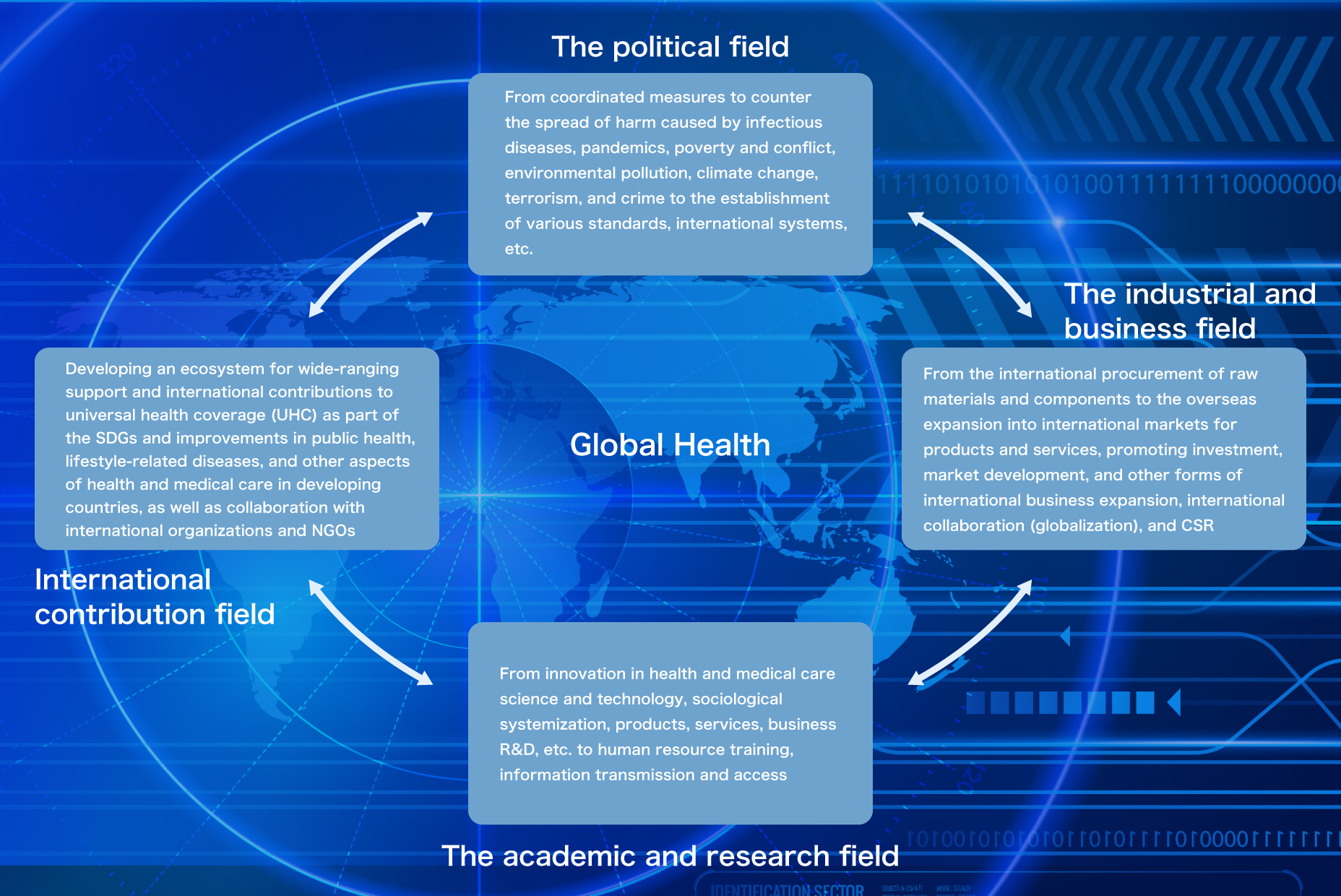
As we strive to achieve UHC and the Sustainable Development Goals (SDGs), we need initiatives that address the spread of infectious diseases, the harm caused by invasive species, environmental pollution, and the spread of disease due to refugee displacement and migration caused by climate change and conflict. We also need to improve public health as well as counter urban lifestyle and non-communicable diseases, develop pre-symptomatic treatment, and implement measures that facilitate access to medical care and health for everyone. Among other things, this requires cooperation between organizations conducting activities related to advocacy and other aspects , the productization and commercialization of science and technology innovations, the establishment of ecosystems for fund matching and similar schemes, and the development of medical care and the health infrastructure in developing countries .
Establishing a global health ecosystem so UHC and SDGs can be achieved
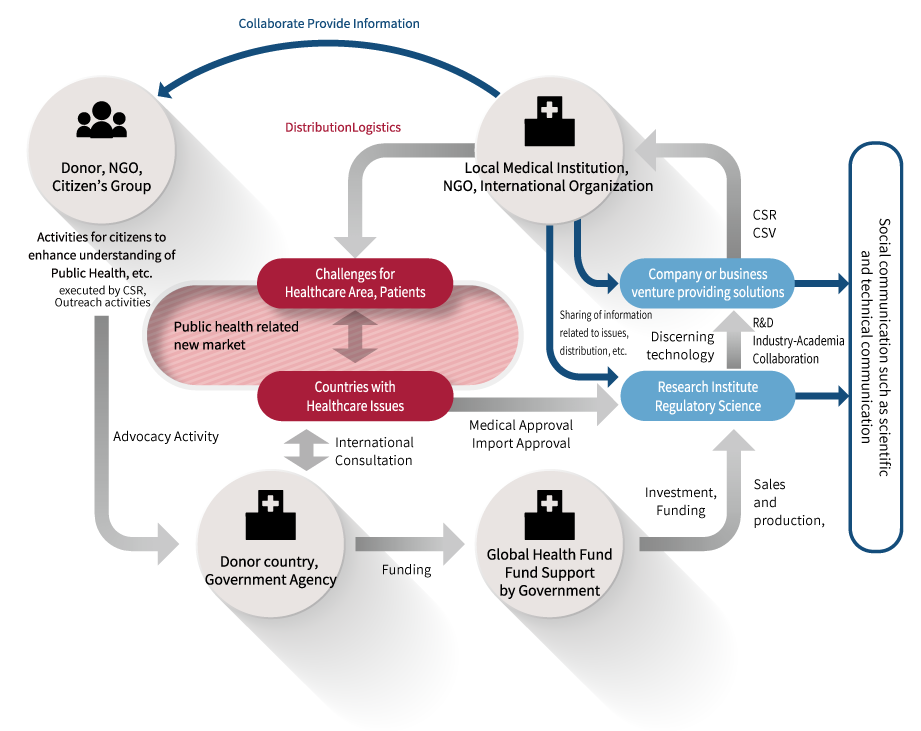
However, global health responses and the establishment of ecosystems that make them possible cannot be realized by any one country or organization, sector, or cluster in a particular field. First, it is important to promote cooperation across diverse sectors and clusters within Japan as well as to promote international support, research, and business.
Policies for achieving global health
- Promote shared awareness among individual countries’ governmental institutions and economic associations, which is reflected in policies; this awareness prompts discussions among governments and project-related discussions
- Carry out all activities in a sustainable manner: partnership networks—such as industry-academia, finance, and local partnerships, which include international agencies and NGOs and consider international business development—are important
- Support cluster partnerships, as they are more beneficial and efficient than individual optimization or support for partnerships among single companies
- Resolve the shortage of human resources to promote international partnerships in this sector and provide training; development of systematization for underdeveloped academic systems in this field
Moreover, global health is an important field in which the participation of diverse actors is immensely meaningful.
A global health business must not only create supply chains from raw material procurement to production and build maintenance networks; it must also introduce products and services at low prices to markets that are accessible for all people, including those in developing countries. International cooperation allowing international dissemination also requires solutions to issues, which may include establishing international maintenance networks, training relevant human resources, the international standardization of products, services, and technologies, and optimizing licensing systems.
The Position and Importance of Global Health from the Perspectives of Diverse Actors
-
International collaboration to prevent the spread of harm from infectious diseases, eradicate their sources, and develop and distribute vaccines, etc.
International safety measures to prevent harm from infectious diseases (pandemics), environmental and food pollution, pests and vermin, etc. (spread prevention and source eradication); international collaboration to support the prompt development and certification of vaccines, etc., as well as their local distribution to terminal patients, medication, and treatment
-
Initiatives for Universal Health Coverage (UHC) as part of the SDGs
Public health, water, and nutritional measures for developing countries and countries in conflict as well as regions and cultures facing challenges involving refugees, poverty, discrimination, climate change, and natural disasters; developing UHC infrastructure as part of the SDGs; measures to tackle background factors such as conflicts, refugees, poverty, discrimination, and climate change
-
Effective measures for social issues and health economy across the international community as well as international-level responses to intractable diseases, etc.
Curtailing each country’s rising medical care spending for diverse initiatives against lifestyle-related diseases and non-communicable diseases (NCDs), including chronic lung disease, diabetes, cancer, cardiovascular disease, and mental illness; promoting the health economy; and pro-active measures for urbanizing emerging nations. Expanding the number of diseases classified as rare and developing treatments on an international scale.
-
Realizing international collaboration and global expansion in R&D, innovation, and business
Promoting science, technology, and innovation R&D in medical care and health by matching funds and industries; developing and launching marketing that targets international markets (problem regions) in need of commercialized services and products or drug discovery; international procurement of raw materials and components; business matching across different fields
-
International standardization and agreements between relevant organizations to support national debates on systems and policy and to disseminate safety and efficiency practices
International standardization, de facto standardization, inter-governmental talks on anti-cyberterrorism policy, and agreements between relevant domestic organizations for the safe and rational global management of each country’s systems, policies, certifications, equipment, and information systems for highly localized social security, pharmaceuticals, insurance, medical tourism, etc.
-
International contributions through collaboration with society, inter-regional collaboration, and collaboration between diverse sectors
Establishing platforms and promoting advocacy, outreach, and CSR to develop information exchange, collaboration, proactive awareness, activity sustainability, and an ecosystem for diverse sectors and clusters in the global health field, including international organizations, governments, academia, industry, NGOs, and NPOs
Nevertheless, global health promotion is faced with challenges in international cooperation, the lack of opportunities for participation, and other issues.
Issues related to global health promotion and international partnerships
-
Diversity of related government administrative, academic, and industry organizations
A wide range of health and medical care-related policies and administrative organizations are involved, and there is a shortage of policies, opportunities, funds, and participation by different sectors, among other issues, aimed at promoting new efforts
-
Systems and safety standards that differ by country
Difficulties with approvals and dissemination due to differences in health and medical care sector concepts, safety standards, approval systems, culture, ethical perspectives, and perceptions related to the field; approval measures in times of emergency
-
Necessity of partnerships among different sectors arising from technological progress
Expectations for innovations resulting from the technologies of different sectors, including the growing fields of information and communications technology, the “internet of things” (IoT), and artificial intelligence (AI), robots, energy, and biotechnology, among other areas; and the lack of opportunities to participate
Against this background, the Global Health Initiative (GHI) supports diverse sectors and clusters in Japan and abroad that promote global health in a variety of ways, including international support, research, and business, by assisting the collection and transmission of information as well as coordination, human resource training, and project development.
Illustration of international organizations’ liaising with Kansai
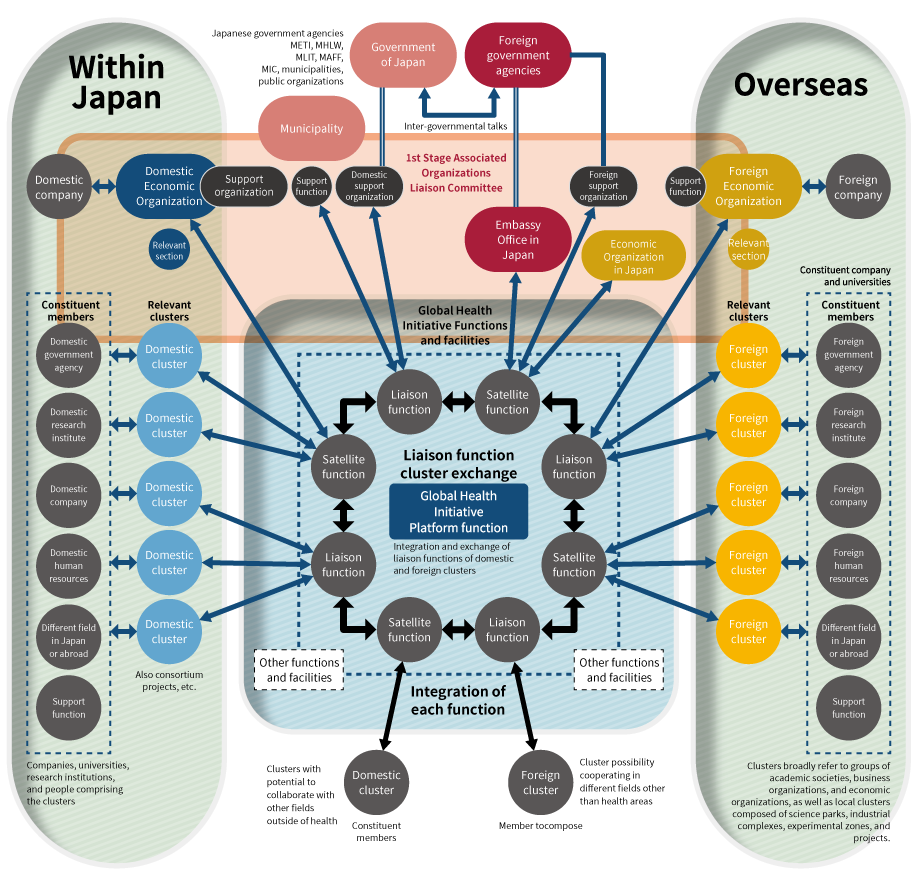
We are facilitating more efficient and effective global health promotion by integrating the functions and needs of government agencies, economic organizations, and others in Japan and abroad.
Functional collaboration between government agencies, business organizations, etc.
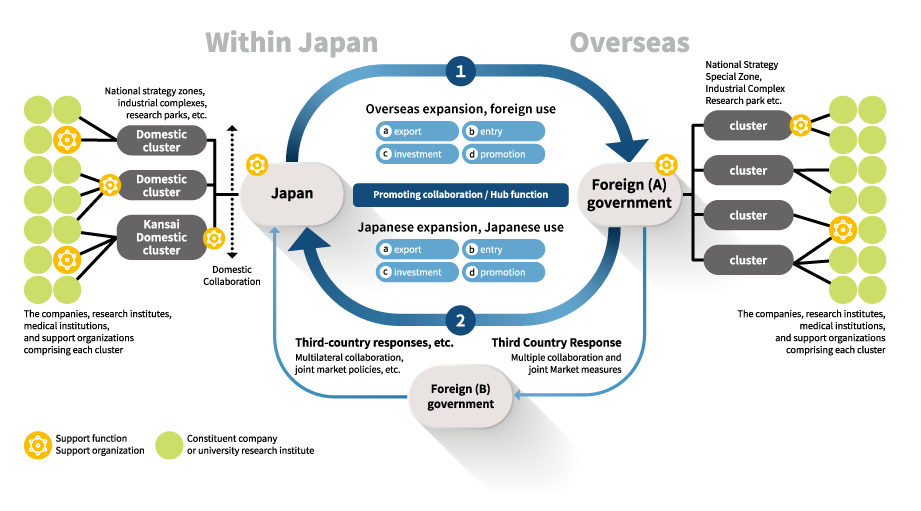
One of the GHI’s concrete actions has been the establishment of the GHI Associated Organizations Liaison Committee (Networking), which has provided opportunities for representatives of diverse sectors and clusters to exchange information face-to-face since 2017. We also organize study groups and working groups (WG) on particular themes, and are working to develop a platform with even more functions to facilitate various forms of cooperation and information transmission in the future.
Short-Term Schedule Showing Milestones
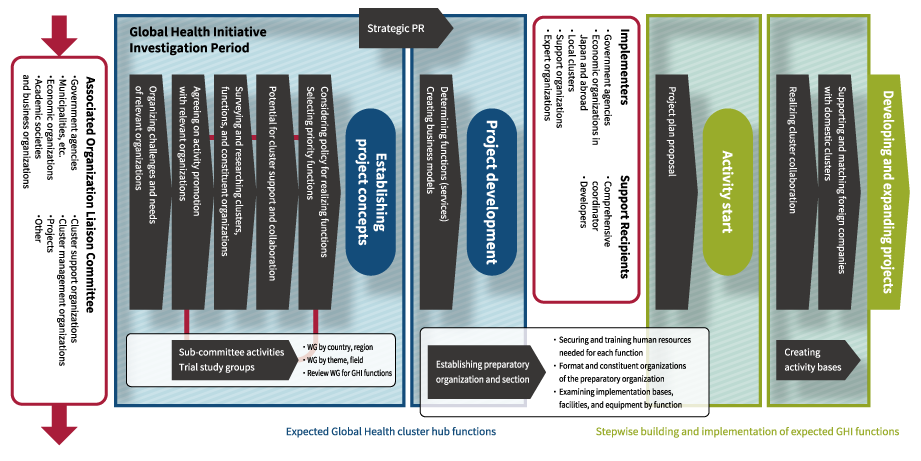
- Networking meetings, liaison conference, information exchange
- Liaison satellite office, human resource functions
- Specialized, high level personnel training functions, global health human resource training
- Cluster partnerships, regional and functional partnership functions
- Activity support function intermediation, support organization partnerships
- Business matching, all sorts of interaction and partnership support functions
- Global health fund and ecosystem building promotion functions
- CInformation gathering and dissemination functions
- Investigative research, think tank functions
- Various workshop activities, project formulation functions
- MICE (meetings, incentives, conferencing, exhibitions) functions
- Start-up office and co-working functions
- Consulting incubation, business support functions
- CSR, CSV, outreach, society partnership, function to augment understanding
- Other anticipated functions